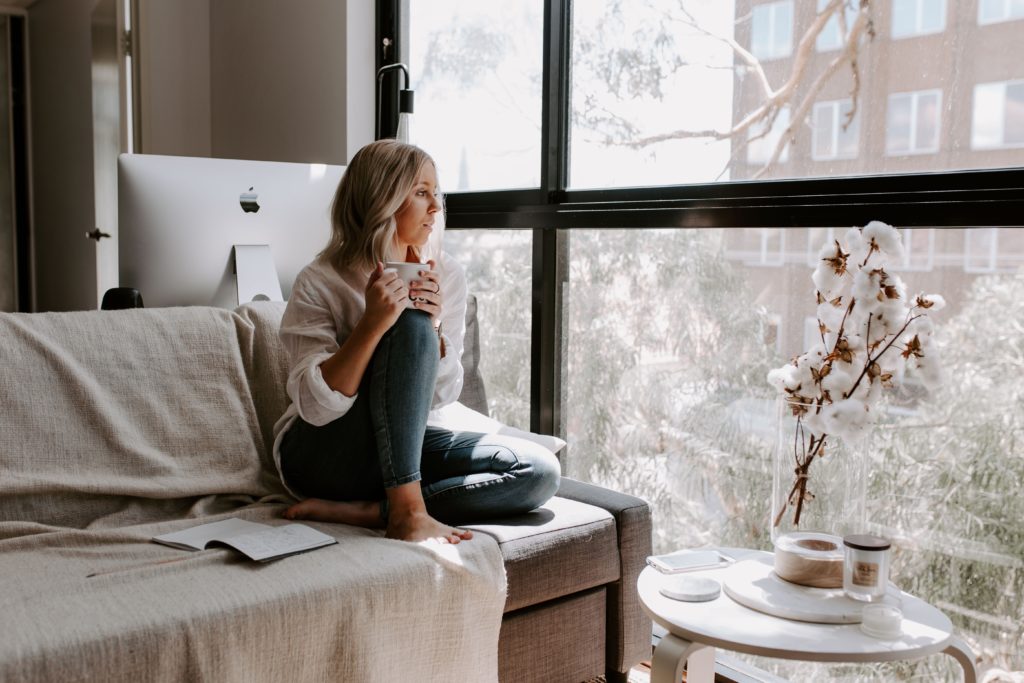September 5, 2020
We get unstuck when we meet life on life’s terms.
Because impermanence is one of the few things we can count on, discomfort is, to our dismay, part of the human condition. In spite of our spiritual leanings and our beliefs about an afterlife, the idea of impermanence keeps us off-center.
We all have a reasonable desire to feel good, right now, and all the time — and when we don’t, we don’t like it. We feel a sense of emptiness when happiness disappears. We tell ourselves something’s missing, something’s wrong.
The belief that we can cure or eliminate discomfort is a damaging idea that we sometimes perpetuate in psychotherapy or self-help books.
Trying to rid ourselves of painful feelings would be like trying to cure ourselves of the joy that bubbles up when we see u-tube videos of babies or cats and puppies. Impossible.
Sometimes, when we get quiet and stop running around like chickens with our heads cut off, we can see what’s happening. For the most part, we’re alternating between desperately trying to get rid of any “negative”, uncomfortable feelings, while unsuccessfully attempting to hold on to the bubbly, joyful ones
To cope, some of us resort to alcohol or drugs, or engage in compulsive gambling, shoplifting, sex, emotional eating, video porn, gaming, non-stop talking, controlling others, pontificating, or watching eight hours of soaps a day. The list of avoidance techniques at our disposal is endless.
The antidote to letting the idea of impermanence and our resultant discomfort keep us stuck or bring us down is three-fold.
Stop trying to get rid of it.
You know the adage, “Whatever you resist, persists?” Therapists might say, “You don’t want it? That guarantees you’ll keep it.”
Because here’s the deal: whatever we resist becomes the focus of our attention, blocking us from receiving all the other things life is trying to hand us.
Resistance acts like a cloud covering the sun.
Resistance is a magnet that pushes us toward behaviors that maintain or increase discomfort — actions like trying to logic-away feelings or avoid them with any of the harmful coping mechanisms I already mentioned, or blaming others.
The opposite of resistance brings us to my next point.
Learn to lean into the sharp points.
Teachers of mindfulness talk about leaning into the sharp points or going one step farther than is comfortable — one step into the discomfort, past the edge we’ve constructed as our safety zone.
Besides wrinkles and droops, age has given me the courage to lean into more of the sharp points than I ever imagined I could or would. But there are still some I don’t seem able to lean into, and some I see no point in leaning into at all. So I’ve learned to lean in gently. No need to lean in to the point where you draw blood — that’s not very friendly.
Each time we lean in rather than resist, we are sharpening our decision-making muscle. Leaning in is a conscious movement that takes us off autopilot and brings us back to our best selves.
Leaning in to one of our sharp points, say taking a risk in being honest in a relationship, can have a surprising and far-reaching impact on all our relationships. As I make peace with more and more of my discomforts, others seem to drift away with less effort on my part.
Lean in gently, and don’t rush it. Tiny, consistent steps performed over time result in much more lasting change than dramatic leaps into new behaviors that we’ve not yet made friends with. Small steps allow us to build up our confidence and sense of competence.
My resistance always seems to involve relationships. Yours might be about career, or physical well-being, or like me, relationships that could be more satisfying. I know I need to lean in when I feel resentful, immobilized, or want to run away.
For me, leaning in means having the hard conversations — either with “them” or sometimes with myself when I notice I’m building a case against someone, rather than looking for where we can meet in the middle.
This brings us to the most important point.
Take one hundred percent responsibility for creating the life you want.
From this moment on, take 100% responsibility for how you handle what life has handed you. Make learning, not winning, your goal. Surround yourself with like-minded people and celebrate every small victory along the way.
The very act of acknowledging and accepting that we will occasionally experience a sense of emptiness allows us to live bigger. We can take all the time and energy we’ve been expending on avoiding, blaming, or trying to control what we can’t control, and put it toward behaviors that will likely generate more of the bubbly, joyful feelings and experiences we want.
Are there discomforts you’ve been avoiding because you’re afraid you can’t handle them? Is there a choice you need to make? Do you have a relationship you want to mend? Is there a lifestyle change you have been thinking about making but haven’t taken the first step?
Before you do anything, notice that the barrier is natural resistance. Rather than aggressing against the discomfort, or becoming immobilized, or running away, lean into the sharp points to discover they aren’t as sharp or dangerous as they seem.
And finally, step up. Decide to take one hundred percent responsibility for your life from this moment on.
And next time you notice you’re scaring yourself about having a bit of discomfort, remember this — there is nothing wrong with you. You are utterly fully human.
Much love,

